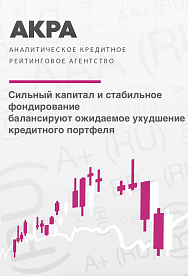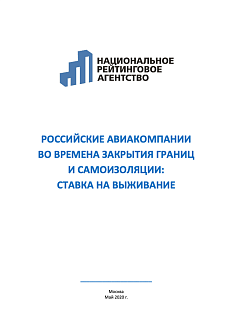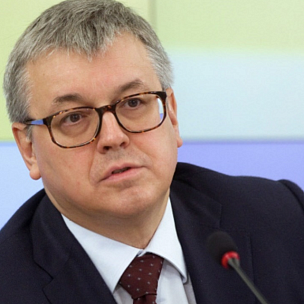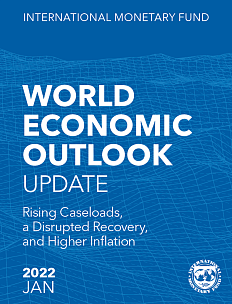In this work, the Analytical Credit Rating Agency (ACRA) examines the operations of Sberbank, Russia’s largest bank. The analysts study the Bank’s distinctive features which ensure its balanced and stable functioning in a worsening economic situation shaped by the coronavirus pandemic and the global oil crisis. ACRA expects a growth of problem debt due to a fall in the income of the population and businesses. Nevertheless, a diversified loan portfolio and high business diversification combined with Sberbank’s critical systemic importance for Russia’s financial system will ensure the Bank’s balanced and stable functioning in the current conditions.
The Roscongress Foundation presents the salient points of the publication accompanied by fragments of broadcasts of relevant panel discussions from the business programme of international events held by the Roscongress Foundation.
Sberbank’s dominant position in the Russian banking sector contributes to the stability of its operations.
The significant diversification of the Bank’s business, as well as its presence in almost all regions of the Russian Federation and in the international market, ensure the stability of Sberbank Group’s operating income. The increase in income from bank card operations and cash and settlement services, as well as from non-banking and digital businesses, reduces concentration on interest income via increased commission income and increases the Bank’s resistance to fluctuations associated with the recession.
Its dominant position in the Russian banking market allows Sberbank to set more favorable price targets for its main active and passive operations. In 2019, Sberbank’s share in the Russian banking sector’s total profit decreased to about 40% compared to the previous year. ACRA expects this indicator to grow in 2020 amid the projected overall decline in banking profit.
Increased productivity and improved business processes, combined with a significant increase in the share of customers served digitally, affords the Bank high operational efficiency despite the increase in operating expenses, which are largely associated with the cost of developing the IT platform.
Economic recession and its repercussions may cause a significant growth in problem loans, especially in the consumer lending segment.
The worsening of the economic situation due to the spread of the coronavirus and the fall in the price of oil will have a negative impact on the ability of many Russian bank borrowers to service their loans. ACRA anticipates considerable growth of problem debt in the consumer and SME lending segments in particular. ACRA’s expectations are based on potential significant growth of unemployment, a fall in the income of the population and small businesses, and also the increased debt load of these groups of borrowers over the past few years.
Consumer loans and credit cards demonstrated higher-than-anticipated growth (around 25% for the year) in the retail lending portfolio due to lower interest rates on loans and the population compensating for declining real incomes. Given the enhanced risks and toughening of regulations, ACRA expects the Bank to significantly cut lending rates in this segment in 2020.
The structure of the Bank’s corporate lending portfolio is well diversified by sectors, with the largest accounting for less than 8% of the entire portfolio. According to ACRA, the most likely scenario amid an expected decline in demand for credit resources in 2020 will be a lack of growth in the Bank’s corporate lending portfolio. ACRA notes that over the past four years, there has been a trend toward improvement in the quality of Sberbank’s loan portfolio. Currently, it is characterized by an acceptable level of problem debt.
Balanced funding profile and the Bank’s systemically important role support its stability in the current conditions.
The Group’s liabilities are characterized as being highly stable and consist primarily of funds of individuals (56% of liabilities) and corporate clients (29% of liabilities), of which 70% are held in time deposits. ACRA assesses the diversification of the structure of funding by clients as good: as of the end of December 2019, the 20 largest groups of creditors accounted for 14.9% of the Bank’s total liabilities.
The theoretical default of the Bank could lead to crisis phenomena occurring in the Russian economy related to the necessity to compensate client funds, including the funds of state-owned companies and budgets, the violation of transaction chains, and other reasons.
In accordance with the methodology of the Central Bank of the Russian Federation, Sberbank is a systemically important credit organization, and its payment system is of national and social importance. Taking the aforementioned into account, and also the likelihood of the Russian Government maintaining shareholder control over the bank in the long term, ACRA assesses the possibility of the state providing support to Sberbank (if necessary) as very high.
For more information about possible ways to stabilize the economy during the pandemic, please see the StayHomeEconomy special section of the Roscongress information and analytical system. See also the Monetary policy, Banking and Financial market sections about specific aspects of monetary policy which contribute to creating favorable conditions for balanced economic development and a rise in living standards.






